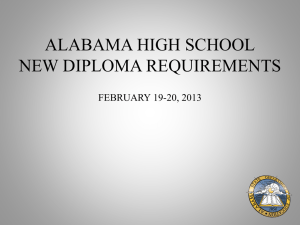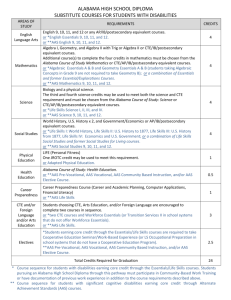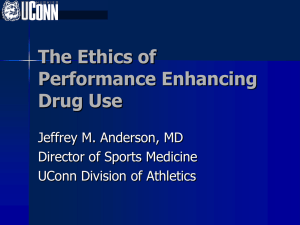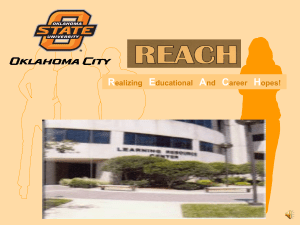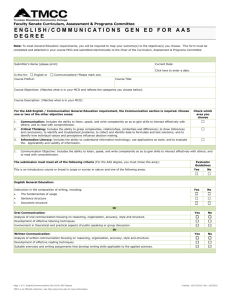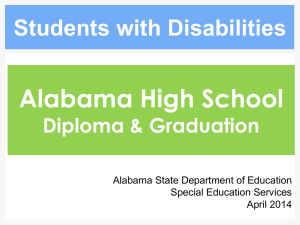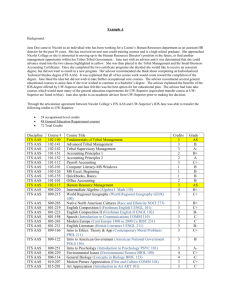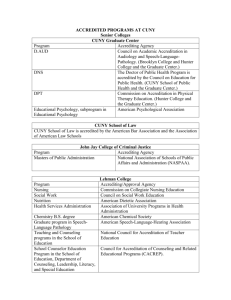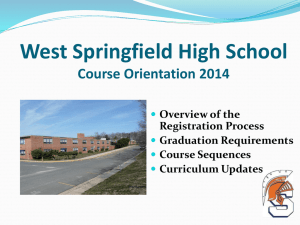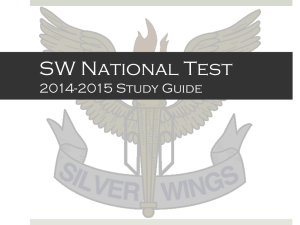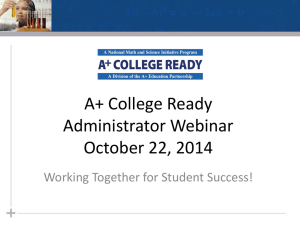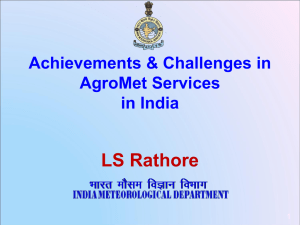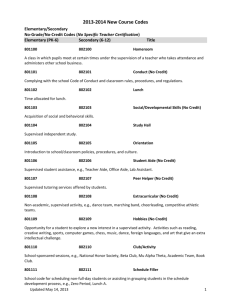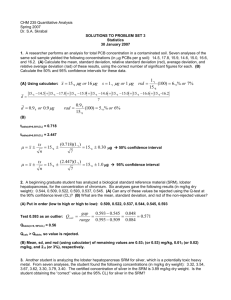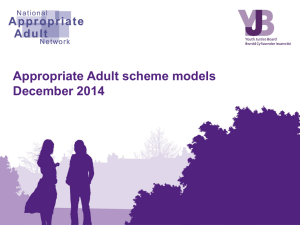State Course Code Project - Alabama Department of Education
advertisement
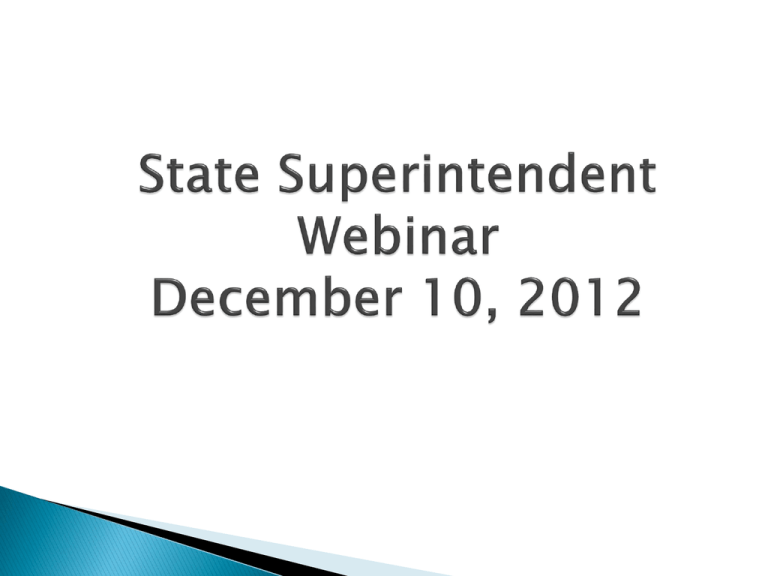
ALABAMA HIGH SCHOOL DIPLOMA This one approach to the Alabama High School Diploma removes the need for endorsements or the Alabama Occupational Diploma. The focus will be on the coursework taken that necessitates a clearly articulated and individualized four-year high school plan built for each student based on the results from the EXPLORE academic and career interest assessment and middle school coursework. 12-6-12 Draft 2 ALABAMA HIGH SCHOOL DIPLOMA SUBSTITUTE COURSES FOR STUDENTS WITH DISABILITIES AREAS OF STUDY English Language Arts Mathematics Science Social Studies Physical Education Health Education Career Preparedness CTE and/or Foreign Language and/or Arts Education Electives REQUIREMENTS English 9, 10, 11, and 12 or any AP/IB or postsecondary equivalent option of these courses. or *English Essentials 9, 10, 11, and 12. or **AAS English 9, 10, 11, and 12. Algebra I, Geometry, and Algebra II with Trig or Algebra II or their equivalent. Additional course(s) to complete the four credits in mathematics must be chosen from the Alabama Course of Study Mathematics or CTE/AP/IB equivalent courses. or *Algebraic Essentials A & B and Geometry Essentials A & B (students taking Algebraic Concepts in Grade 9 are not required to take Geometry B). or **AAS Mathematics 9, 10, 11, and 12. Biology and a physical science. The third and fourth science credits may be used to meet both the science and CTE requirement and must be chosen from the Alabama Course of Study: Science or CTE/AP/IB equivalent courses. or *Life Skills Science I, II, III, and IV. or **AAS Science 9, 10, 11, and 12. World History, U.S. History x 2, and Government/Economics or AP/IB/Dual Enrollment equivalent courses. or *World History for Living, U.S. History for Living 10, U.S. History for Living 11, and Economics for Living/U.S. Government for Living . or **AAS Social Studies 9, 10, 11, and 12. LIFE (Personal Fitness) One JROTC credit may be used to meet this requirement. or Adapted Physical Education. Alabama Course of Study: Health Education. or **AAS Pre-Vocational, AAS Vocational, AAS Community Based Instruction, and/or AAS Elective Course. Career Preparedness Course (Career and Academic Planning, Computer Applications, Financial Literacy) or **AAS Life Skills Students choosing CTE, Arts Education, and/or Foreign Language are encouraged to complete two courses in sequence. or *two CTE courses and Workforce Essentials (or Transition Services II in school systems that do not offer Workforce Essentials). or **AAS Life Skills. *Students earning core credit through the Essentials/Life Skills courses are required to take Cooperative Education Seminar/Work-Based Experience (or LS Occupational Preparation in school systems that do not have a Cooperative Education Program). **AAS Pre-Vocational, AAS Vocational, AAS Community Based Instruction, and/or AAS Elective Course. Total Credits Required for Graduation CREDITS 4 4 4 4 1 0.5 1 3 2.5 24 * Course sequence for students with disabilities earning core credit though the Essentials/Life Skills courses. ** Course sequence for students with significant cognitive disabilities earning core credit through Alternate Achievement Standards (AAS)courses. Why Change? What Is It? How Does It Work? What Has Happened So Far? What Is Next? Easier In 2010, we had over 20,000 state course codes for LEAs to use. Developed a new streamlined numbering system. What’s best for the student Greater accuracy that students are given appropriate credits for their courses. When they transfer between schools. Upon graduation. Automated systems such as AHSAA, Formative Assessments, etc. State Course Code will take the place of the Local Valid Course numbers A “shred out” capability is added so LEAs can have multiple local courses mapped to a single state course code. Still give locals total flexibility in naming their courses to match report card needs and scheduling needs. The functionality will be delivered thru the InformationNOW Winter release There are two pieces (bundled into the release) Data Conversion Changes in InformationNOW Data Conversion Only courses for 2013-2014 forward will be affected Local course numbers are changed to the existing state course code If multiple local course numbers are tied to a single state code, “shred out” characters are added to the end of the new course number 203111, 203111aa, 203111ab…. Existing master schedule section numbers will be padded to 3 characters (01 – 001) Historical data will not be affected (transcripts) LEA’s or schools will only need to map their 800000 series courses for the 2013-14 school year Professional development for registrars and counselors on using state codes versus only local codes A data conversion phase was tested with pilots Auburn, Opelika, Hoover, Lee, Chambers Transcripts were verified as unaffected Before and after LEAPS submissions were checked by ALSDE New 2013-14 State Valid Course File Now ready (per your request to have by January) Major changes 800000 series where there were still over 2,100 different courses Special Education AAS courses redefined All new 800000 series course numbers were approved by pilots as meeting their needs New Course Codes for 2013-14 will be covered in upcoming Curriculum & Instruction Regional Meetings Sessions by ALSDE staff and STI staff at both December and January STI User Conferences covering details of both STI screens and new course codes for 2013-14 WebEx Sessions by ALSDE staff in January covering details of both STI screens and new course codes for 2013-14 Software release currently scheduled as part of STI Winter Release New 2013-14 Course Codes already available at http://www.alsde.edu/html/PersonnelCodes.asp Our financial statements show we have completed this past fiscal year better than the year before. We have reduced from 31 districts down to 20 districts statewide who have not achieved the required one-month balance. This report shows that our superintendents, program directors, and financial staff have worked collaboratively to weather the storm. Hopefully, with a successful legislative session, we can continue to build on existing efficiencies and help fill in for many of the resources that are needed.
